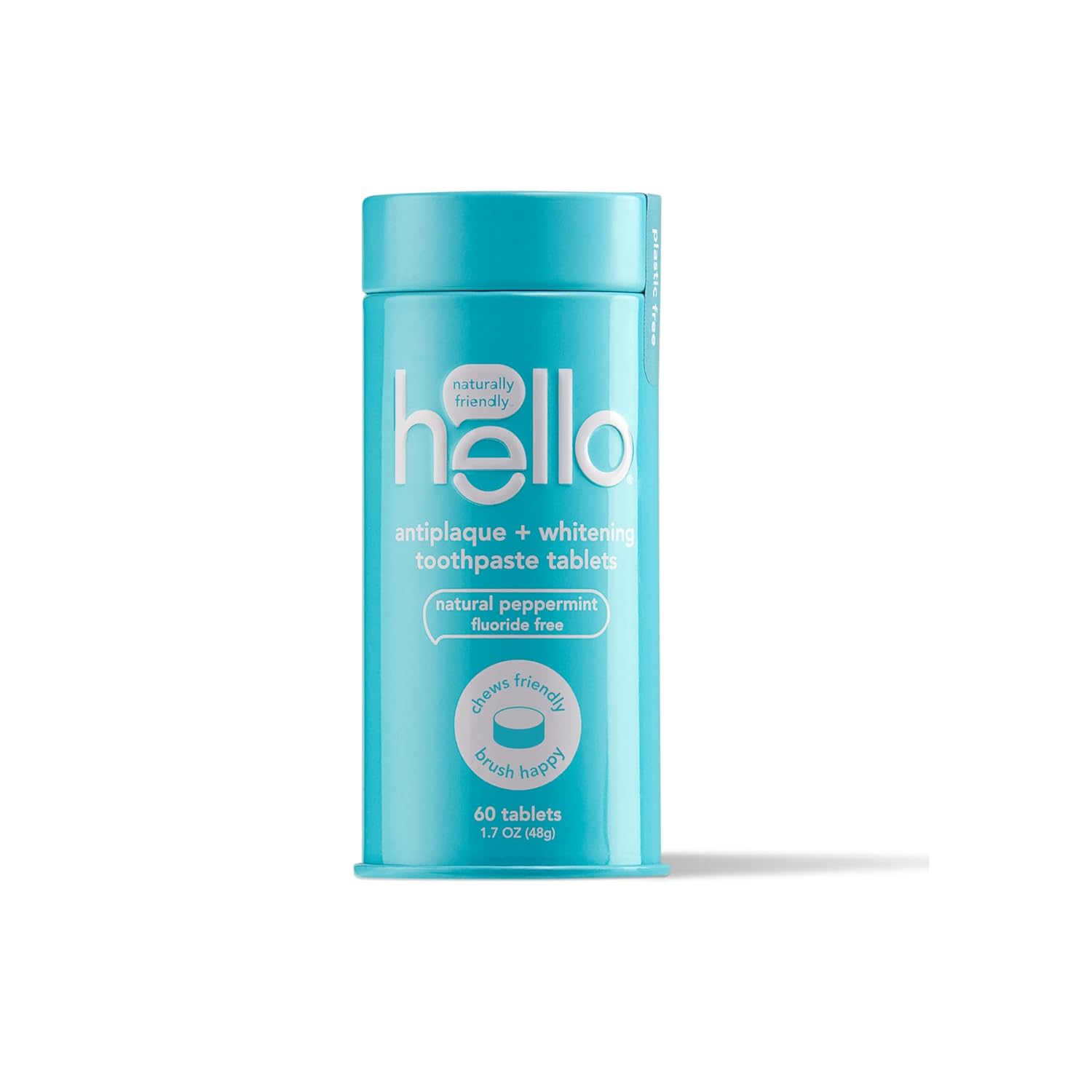
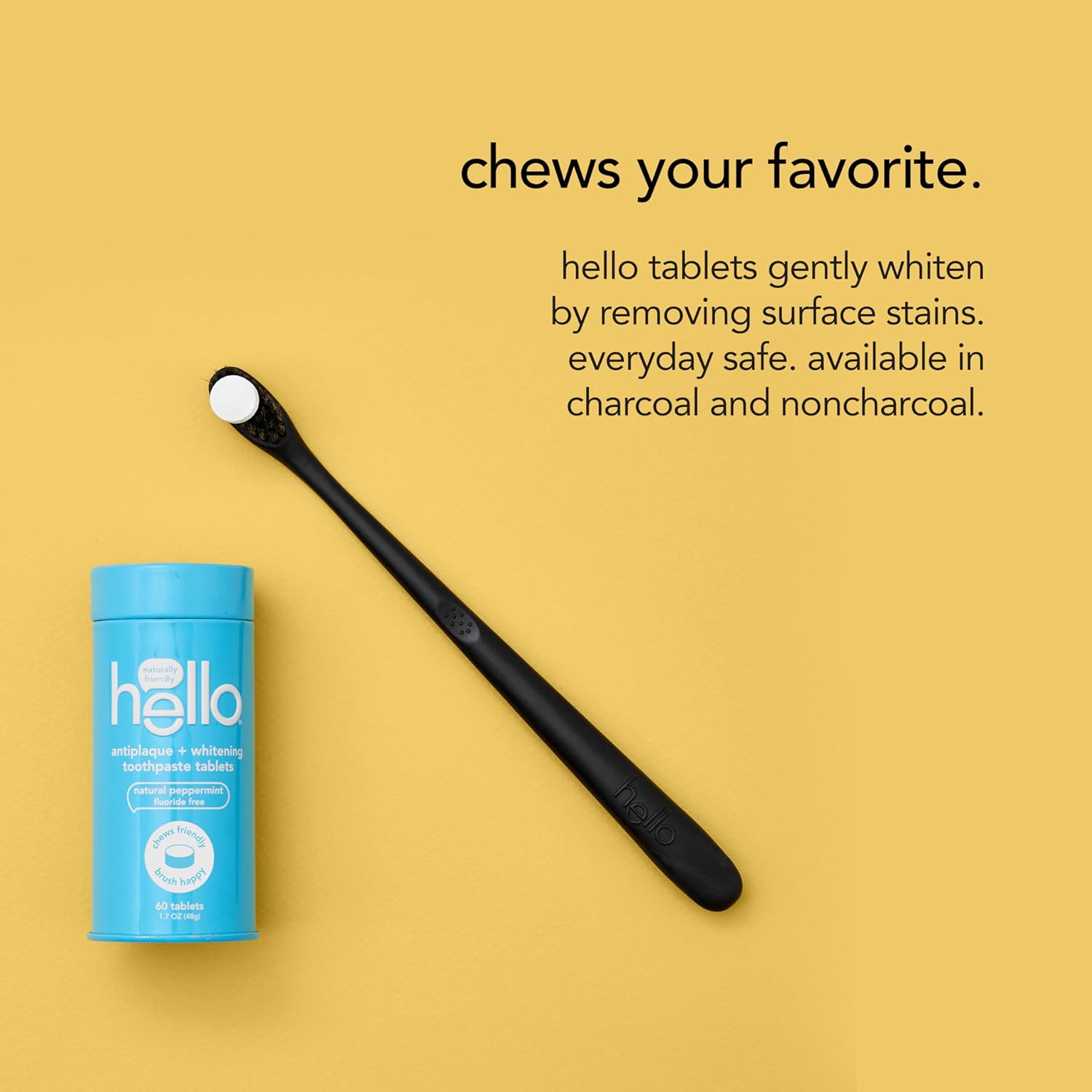
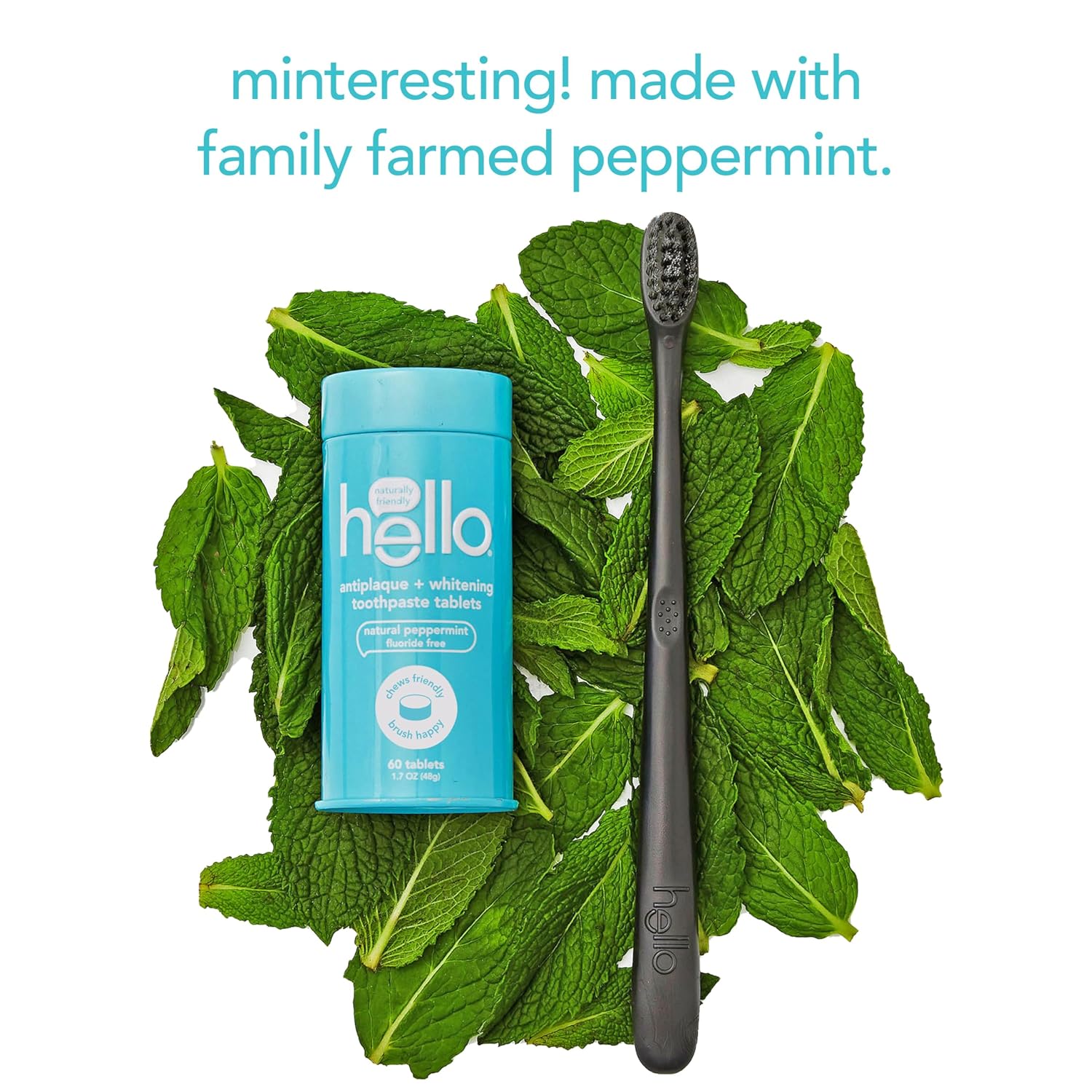
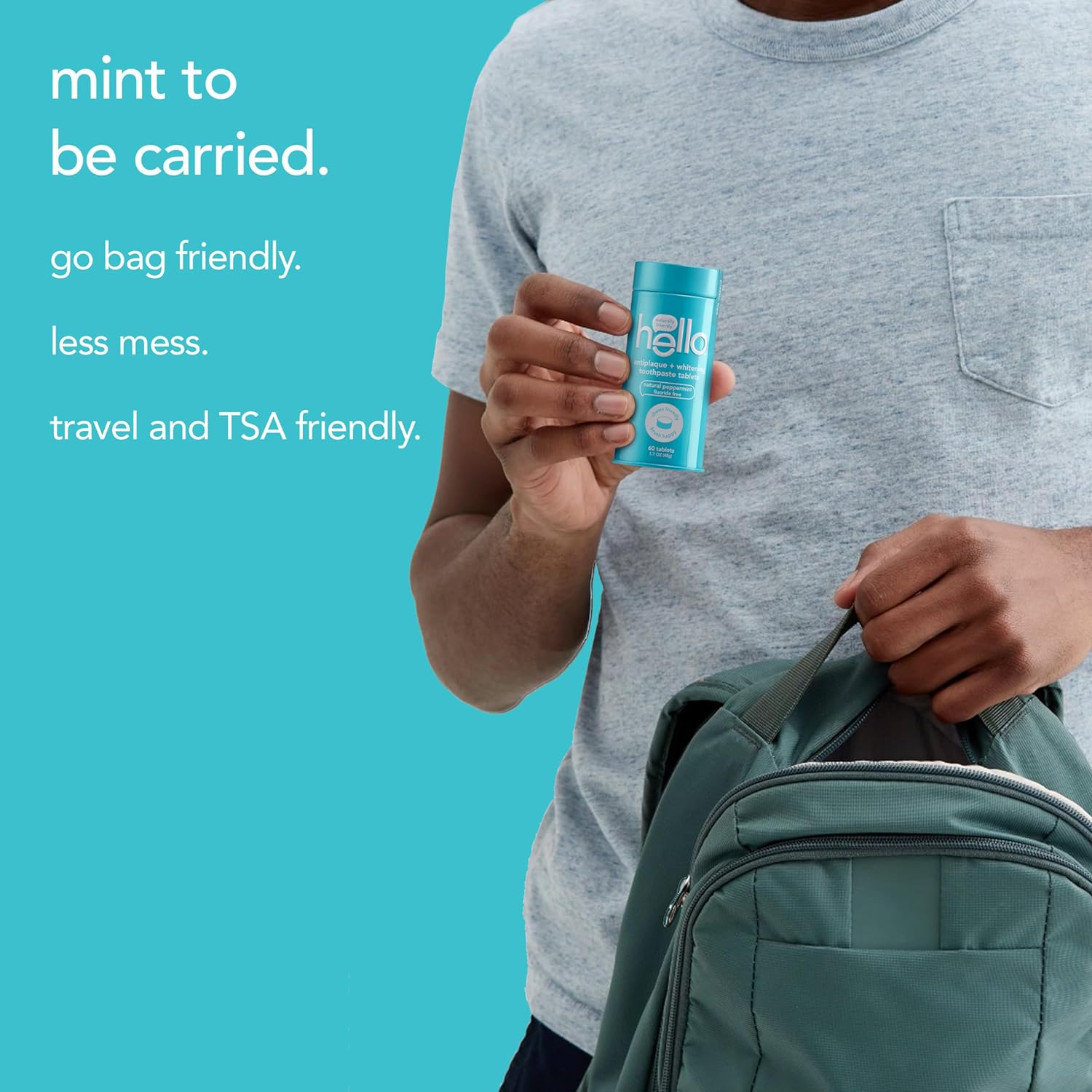
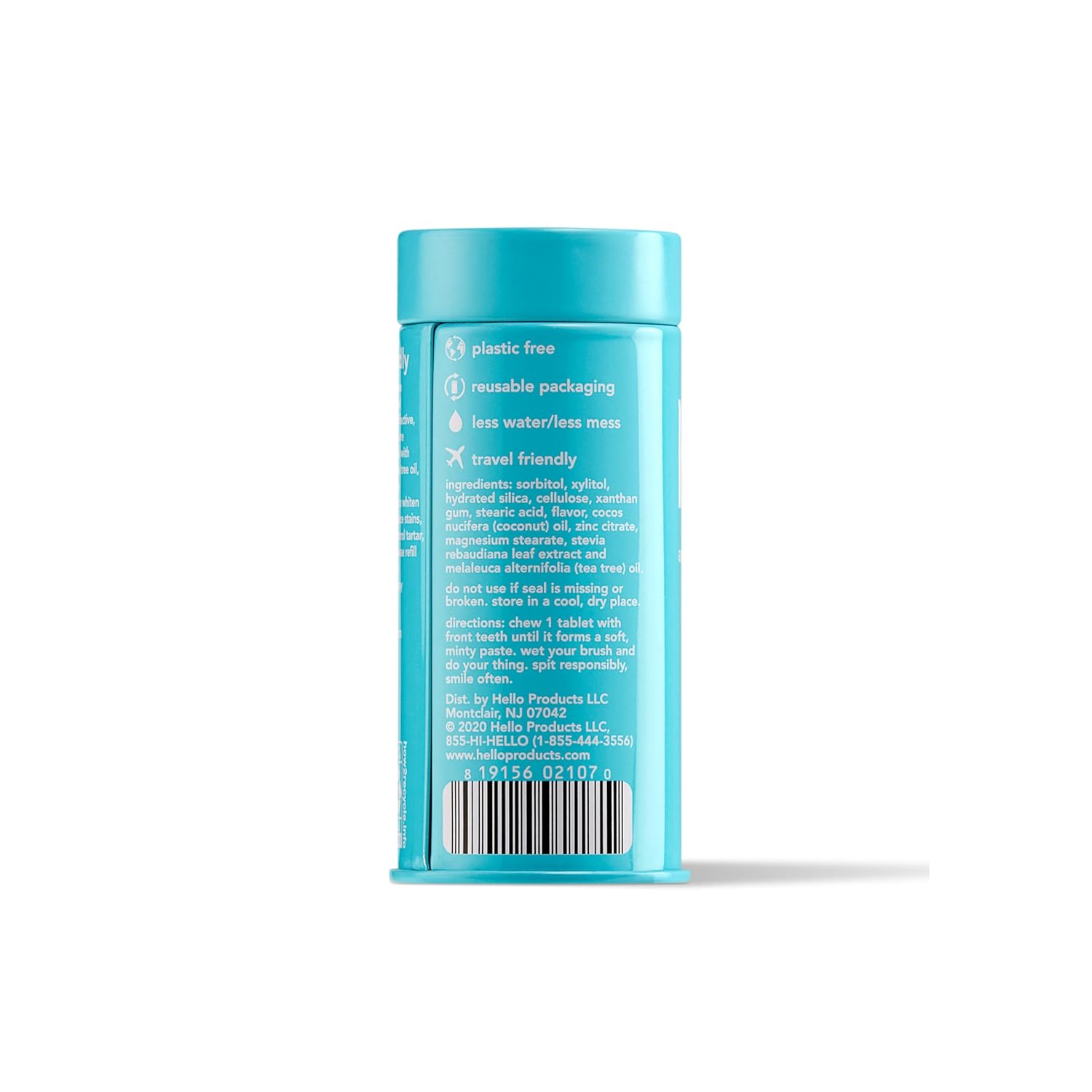
hello Toothpaste Tablets - Antiplaque, Whitening, Vegan, Fluoride-Free, Natural Peppermint - 60ct
Zinc Citrate
High RiskZinc citrate is a zinc salt of citric acid, commonly used in various personal care and cosmetic products. It serves as a mineral and provides benefits related to skin health.
Sustai Insights
Zinc citrate functions well as a skin-conditioning agent and may support skin repair. However, it has high use restrictions due to potential health risks, including irritation and limited evidence of bioaccumulation concerns. Regulatory bodies restrict its use, contributing to an overall high-risk assessment. Safe usage practices should be observed, and alternatives may include other zinc compounds with better safety profiles.
Melaleuca Alternifolia (Tea Tree) Leaf Oil
Medium RiskMelaleuca alternifolia (tea tree) leaf oil is derived from the leaves of the Melaleuca alternifolia tree. It is commonly used in personal care products for its antiseptic and antimicrobial properties, making it a popular ingredient for skincare formulations.
Sustai Insights
Tea tree leaf oil offers functional benefits, including antimicrobial properties that can help with skin conditions. However, it has a high allergenic potential and may cause skin irritation or allergic reactions in sensitive individuals. Additionally, while it poses low to moderate risks concerning endocrine disruption and reproductive toxicity, it is restricted in certain formulations. Overall, the ingredient is assessed as medium risk, necessitating careful usage and consideration of alternatives for sensitive populations.
Unspecified Flavor
Medium RiskUnspecified flavor refers to a term used by cosmetic manufacturers to denote a flavoring component in products. This ingredient functions primarily to enhance the sensory experience of the product, providing a pleasant taste or scent without specifying the exact composition of the flavoring agents used.
Sustai Insights
Unspecified flavor serves as an effective sensory enhancer in cosmetic products, adding taste or aroma without revealing specific ingredients. However, it may pose low health risks, including potential allergens or irritants, with no significant carcinogenic or reproductive toxicity concerns. Environmentally, it is not known to be bioaccumulative or a notable pollutant. Regulatory bodies impose minimal restrictions on its use. Given these factors, the overall risk level is assessed as medium, necessitating cautious use and consideration of potential safer alternatives.
Sorbitol
Low RiskSorbitol (glucitol) is a type of sugar alcohol used primarily as a sweetener and humectant in various food and cosmetic products. It is known for its moisture-retaining properties and is often found in sugar-free foods and personal care formulations.
Sustai Insights
Sorbitol serves effectively as a sweetener and humectant while being considered biodegradable and sustainably sourced. Health risks are low, with no significant concerns regarding carcinogenicity, allergies, or reproductive toxicity. Environmental assessments indicate minimal pollutant potential and low bioaccumulation. Regulatory bodies, including the FDA, have approved its use, but it is subject to specific guidelines. Overall, sorbitol presents a low risk profile, making it a suitable ingredient in food and cosmetic applications.
Stevia Rebaudiana (Sweetleaf) Extract
Low RiskStevia rebaudiana extract is an extract derived from the leaves of the Stevia plant, known for its natural sweetening properties. It is commonly used as a sugar substitute in various food and beverage products due to its intense sweetness without contributing calories.
Sustai Insights
Stevia rebaudiana extract offers functional benefits as a natural sweetener with no calories, making it a popular choice for sugar substitutes. It is sustainably sourced and biodegradable. Health risks are minimal, with low concerns for carcinogenicity, allergies, or reproductive toxicity. Environmental risks are also low, as it is not a known pollutant or bioaccumulative. Regulatory bodies do not impose significant restrictions on its use. Overall, it is considered a low-risk ingredient, with safe usage practices recommended for optimal consumption.
Cellulose
Low RiskCellulose is a natural polysaccharide derived from plant cell walls, primarily used as a thickening agent, stabilizer, and emulsifier in cosmetic formulations. It is known for its ability to improve texture and consistency in products.
Sustai Insights
Cellulose serves as an effective thickening and stabilizing agent, enhancing product texture while being biodegradable and derived from renewable sources. Health risks are minimal, with low concerns regarding carcinogenicity, allergies, and reproductive toxicity. Environmental impacts are also low, as cellulose does not contribute significantly to pollution or bioaccumulation. Regulatory agencies have not issued restrictions on its use. Overall, cellulose presents a low risk profile, making it a suitable ingredient choice in cosmetics.
Stearic Acid
Low RiskStearic acid is a naturally occurring fatty acid commonly found in animal and vegetable fats. It functions primarily as an emulsifier, thickener, and stabilizer in cosmetic and personal care products, providing texture and consistency.
Sustai Insights
Stearic acid offers functional benefits such as effective emulsification and stabilization of formulations. It is derived from renewable sources and is biodegradable, contributing to its sustainability profile. Health risks are low, with minimal concerns regarding carcinogenicity, allergies, or reproductive toxicity. Environmental risks are also low, with no significant pollutants or bioaccumulation concerns noted. Regulatory bodies, including the FDA, do not impose restrictions on its use. Overall, stearic acid is assessed as low risk, and its safe usage practices are well-established, with no significant alternatives needed.
Magnesium Stearate
Low RiskMagnesium stearate is a magnesium salt of stearic acid, commonly used as a lubricant and anti-caking agent in pharmaceuticals and cosmetic products. It helps in the manufacturing process by preventing ingredients from clumping together and ensuring even distribution in formulations.
Sustai Insights
Magnesium stearate is recognized for its functional benefits as a lubricant and anti-caking agent, enhancing product stability. It is considered low risk regarding health concerns, including carcinogenicity and allergenic potential, with no significant environmental hazards reported. Regulatory bodies, including the FDA, have not imposed major restrictions, supporting its safe use in various applications. Recommended usage levels are typically low, maintaining safety in formulations. Overall, the ingredient is assessed as low risk, with no significant adverse health or environmental impacts identified.
Hydrated Silica
Low RiskHydrated silica is a form of silicon dioxide that appears as a fine, white powder. It is commonly used in cosmetic products for its thickening, anti-caking, and absorbent properties, enhancing product texture and stability.
Sustai Insights
Hydrated silica serves as an effective thickening agent and absorbent, contributing to product stability. It has a low potential for health risks, with minimal concerns regarding carcinogenicity, allergies, or reproductive toxicity. Environmental risks are also low, with no significant bioaccumulation or pollution concerns. Regulatory bodies do not impose major restrictions, classifying it as low-risk overall. For safe usage, it is recommended to follow product instructions. Alternatives include more natural thickeners like xanthan gum for sustainable formulations.
Xylitol
Low RiskXylitol is a sugar alcohol used primarily as a sweetener. It is commonly found in oral care products and food items, offering a sweetening effect similar to sugar but with fewer calories. It serves as a humectant and can contribute to dental health by reducing the risk of cavities.
Sustai Insights
Xylitol provides functional benefits as a low-calorie sweetener and may help improve dental health by inhibiting cavity-causing bacteria. It is generally recognized as safe by the FDA with low concern for cancer, allergies, or reproductive toxicity. Environmental risks are minimal, as xylitol is biodegradable and does not accumulate in the ecosystem. Regulatory bodies have not imposed significant restrictions. Overall, xylitol presents a low risk when used appropriately, with no major adverse health effects reported and sustainable sourcing options available.
Xanthan Gum
Low RiskXanthan gum is a polysaccharide, a sugar-based compound produced by the fermentation of glucose or sucrose. It is commonly used as a thickening agent and stabilizer in various food and cosmetic products due to its ability to improve texture and prevent ingredient separation.
Sustai Insights
Xanthan gum serves effectively as a thickener and stabilizer, enhancing product texture and consistency. It is biodegradable and typically derived from renewable sources, supporting sustainability efforts. Health risks are minimal, with low concerns regarding carcinogenicity, allergies, and reproductive toxicity. Environmental impact is similarly low, posing no significant hazards. Regulatory agencies, including the FDA, regard it as safe for use, with no significant restrictions. Overall, xanthan gum is assessed as low risk, making it a suitable ingredient in formulations.
Cocos Nucifera (Coconut) Oil
Low RiskCocos Nucifera (Coconut) Oil is derived from the kernels of the coconut palm. It is primarily used in cosmetic formulations for its emollient and moisturizing properties, making it suitable for skin and hair care products.
Sustai Insights
Coconut oil serves as an effective moisturizer and emollient, promoting skin hydration and softness. It is sustainably sourced and biodegradable. Health risks are minimal, with low concerns regarding carcinogenicity, allergens, and reproductive toxicity. Environmental impact is also low, as it does not contribute significantly to pollution or bioaccumulation. Regulatory bodies have not issued restrictions on its use. Overall, coconut oil presents a low risk for health and environmental concerns, making it a safe ingredient in cosmetic products.
Sorbitol
Low RiskSorbitol (glucitol) is a type of sugar alcohol used primarily as a sweetener and humectant in various food and cosmetic products. It is known for its moisture-retaining properties and is often found in sugar-free foods and personal care formulations.
Sustai Insights
Sorbitol serves effectively as a sweetener and humectant while being considered biodegradable and sustainably sourced. Health risks are low, with no significant concerns regarding carcinogenicity, allergies, or reproductive toxicity. Environmental assessments indicate minimal pollutant potential and low bioaccumulation. Regulatory bodies, including the FDA, have approved its use, but it is subject to specific guidelines. Overall, sorbitol presents a low risk profile, making it a suitable ingredient in food and cosmetic applications.
Zinc Citrate
High RiskZinc citrate is a zinc salt of citric acid, commonly used in various personal care and cosmetic products. It serves as a mineral and provides benefits related to skin health.
Sustai Insights
Zinc citrate functions well as a skin-conditioning agent and may support skin repair. However, it has high use restrictions due to potential health risks, including irritation and limited evidence of bioaccumulation concerns. Regulatory bodies restrict its use, contributing to an overall high-risk assessment. Safe usage practices should be observed, and alternatives may include other zinc compounds with better safety profiles.
Stevia Rebaudiana (Sweetleaf) Extract
Low RiskStevia rebaudiana extract is an extract derived from the leaves of the Stevia plant, known for its natural sweetening properties. It is commonly used as a sugar substitute in various food and beverage products due to its intense sweetness without contributing calories.
Sustai Insights
Stevia rebaudiana extract offers functional benefits as a natural sweetener with no calories, making it a popular choice for sugar substitutes. It is sustainably sourced and biodegradable. Health risks are minimal, with low concerns for carcinogenicity, allergies, or reproductive toxicity. Environmental risks are also low, as it is not a known pollutant or bioaccumulative. Regulatory bodies do not impose significant restrictions on its use. Overall, it is considered a low-risk ingredient, with safe usage practices recommended for optimal consumption.
Cellulose
Low RiskCellulose is a natural polysaccharide derived from plant cell walls, primarily used as a thickening agent, stabilizer, and emulsifier in cosmetic formulations. It is known for its ability to improve texture and consistency in products.
Sustai Insights
Cellulose serves as an effective thickening and stabilizing agent, enhancing product texture while being biodegradable and derived from renewable sources. Health risks are minimal, with low concerns regarding carcinogenicity, allergies, and reproductive toxicity. Environmental impacts are also low, as cellulose does not contribute significantly to pollution or bioaccumulation. Regulatory agencies have not issued restrictions on its use. Overall, cellulose presents a low risk profile, making it a suitable ingredient choice in cosmetics.
Melaleuca Alternifolia (Tea Tree) Leaf Oil
Medium RiskMelaleuca alternifolia (tea tree) leaf oil is derived from the leaves of the Melaleuca alternifolia tree. It is commonly used in personal care products for its antiseptic and antimicrobial properties, making it a popular ingredient for skincare formulations.
Sustai Insights
Tea tree leaf oil offers functional benefits, including antimicrobial properties that can help with skin conditions. However, it has a high allergenic potential and may cause skin irritation or allergic reactions in sensitive individuals. Additionally, while it poses low to moderate risks concerning endocrine disruption and reproductive toxicity, it is restricted in certain formulations. Overall, the ingredient is assessed as medium risk, necessitating careful usage and consideration of alternatives for sensitive populations.
Stearic Acid
Low RiskStearic acid is a naturally occurring fatty acid commonly found in animal and vegetable fats. It functions primarily as an emulsifier, thickener, and stabilizer in cosmetic and personal care products, providing texture and consistency.
Sustai Insights
Stearic acid offers functional benefits such as effective emulsification and stabilization of formulations. It is derived from renewable sources and is biodegradable, contributing to its sustainability profile. Health risks are low, with minimal concerns regarding carcinogenicity, allergies, or reproductive toxicity. Environmental risks are also low, with no significant pollutants or bioaccumulation concerns noted. Regulatory bodies, including the FDA, do not impose restrictions on its use. Overall, stearic acid is assessed as low risk, and its safe usage practices are well-established, with no significant alternatives needed.
Unspecified Flavor
Medium RiskUnspecified flavor refers to a term used by cosmetic manufacturers to denote a flavoring component in products. This ingredient functions primarily to enhance the sensory experience of the product, providing a pleasant taste or scent without specifying the exact composition of the flavoring agents used.
Sustai Insights
Unspecified flavor serves as an effective sensory enhancer in cosmetic products, adding taste or aroma without revealing specific ingredients. However, it may pose low health risks, including potential allergens or irritants, with no significant carcinogenic or reproductive toxicity concerns. Environmentally, it is not known to be bioaccumulative or a notable pollutant. Regulatory bodies impose minimal restrictions on its use. Given these factors, the overall risk level is assessed as medium, necessitating cautious use and consideration of potential safer alternatives.
Magnesium Stearate
Low RiskMagnesium stearate is a magnesium salt of stearic acid, commonly used as a lubricant and anti-caking agent in pharmaceuticals and cosmetic products. It helps in the manufacturing process by preventing ingredients from clumping together and ensuring even distribution in formulations.
Sustai Insights
Magnesium stearate is recognized for its functional benefits as a lubricant and anti-caking agent, enhancing product stability. It is considered low risk regarding health concerns, including carcinogenicity and allergenic potential, with no significant environmental hazards reported. Regulatory bodies, including the FDA, have not imposed major restrictions, supporting its safe use in various applications. Recommended usage levels are typically low, maintaining safety in formulations. Overall, the ingredient is assessed as low risk, with no significant adverse health or environmental impacts identified.
Hydrated Silica
Low RiskHydrated silica is a form of silicon dioxide that appears as a fine, white powder. It is commonly used in cosmetic products for its thickening, anti-caking, and absorbent properties, enhancing product texture and stability.
Sustai Insights
Hydrated silica serves as an effective thickening agent and absorbent, contributing to product stability. It has a low potential for health risks, with minimal concerns regarding carcinogenicity, allergies, or reproductive toxicity. Environmental risks are also low, with no significant bioaccumulation or pollution concerns. Regulatory bodies do not impose major restrictions, classifying it as low-risk overall. For safe usage, it is recommended to follow product instructions. Alternatives include more natural thickeners like xanthan gum for sustainable formulations.
Xylitol
Low RiskXylitol is a sugar alcohol used primarily as a sweetener. It is commonly found in oral care products and food items, offering a sweetening effect similar to sugar but with fewer calories. It serves as a humectant and can contribute to dental health by reducing the risk of cavities.
Sustai Insights
Xylitol provides functional benefits as a low-calorie sweetener and may help improve dental health by inhibiting cavity-causing bacteria. It is generally recognized as safe by the FDA with low concern for cancer, allergies, or reproductive toxicity. Environmental risks are minimal, as xylitol is biodegradable and does not accumulate in the ecosystem. Regulatory bodies have not imposed significant restrictions. Overall, xylitol presents a low risk when used appropriately, with no major adverse health effects reported and sustainable sourcing options available.
Xanthan Gum
Low RiskXanthan gum is a polysaccharide, a sugar-based compound produced by the fermentation of glucose or sucrose. It is commonly used as a thickening agent and stabilizer in various food and cosmetic products due to its ability to improve texture and prevent ingredient separation.
Sustai Insights
Xanthan gum serves effectively as a thickener and stabilizer, enhancing product texture and consistency. It is biodegradable and typically derived from renewable sources, supporting sustainability efforts. Health risks are minimal, with low concerns regarding carcinogenicity, allergies, and reproductive toxicity. Environmental impact is similarly low, posing no significant hazards. Regulatory agencies, including the FDA, regard it as safe for use, with no significant restrictions. Overall, xanthan gum is assessed as low risk, making it a suitable ingredient in formulations.
Cocos Nucifera (Coconut) Oil
Low RiskCocos Nucifera (Coconut) Oil is derived from the kernels of the coconut palm. It is primarily used in cosmetic formulations for its emollient and moisturizing properties, making it suitable for skin and hair care products.
Sustai Insights
Coconut oil serves as an effective moisturizer and emollient, promoting skin hydration and softness. It is sustainably sourced and biodegradable. Health risks are minimal, with low concerns regarding carcinogenicity, allergens, and reproductive toxicity. Environmental impact is also low, as it does not contribute significantly to pollution or bioaccumulation. Regulatory bodies have not issued restrictions on its use. Overall, coconut oil presents a low risk for health and environmental concerns, making it a safe ingredient in cosmetic products.
Discover a new way to care for your teeth with hello Antiplaque & Teeth Whitening Eco-Friendly Travel Toothpaste Tablets. These innovative, natural peppermint-flavored tablets provide a sustainable solution for maintaining oral hygiene while being gentle on the planet. Perfect for eco-conscious travelers, each tablet is fluoride-free, SLS-free, and comes in a reusable, recyclable tin, significantly reducing your carbon footprint.
- Eco-Friendly Packaging: Each tablet is packaged in a fully reusable and recyclable tin, promoting sustainability and reducing plastic waste.
- Effective Whitening: Formulated to remove surface stains, these tablets help whiten teeth while freshening breath for a confident smile.
- Natural Ingredients: Made without artificial sweeteners, flavors, dyes, or sulfates, ensuring a clean and safe brushing experience.
- Vegan and Cruelty-Free: hello products are PETA recognized and Leaping Bunny certified, making them a compassionate choice for your oral care routine.
- Travel-Friendly: Compact and TSA compliant, these toothpaste tablets are ideal for on-the-go lifestyles, ensuring you never compromise on oral hygiene.
Choose hello for a brighter smile and a healthier planet.
Subscribe & Save with Sustai
- Best Price Guarantee: Always enjoy the lowest prices on sustainable home essentials.
- No Surprises: We’ll notify you before shipping. No hidden fees, ever.
- You’re in Charge: Change, pause, or cancel your subscription anytime with ease.
- Eco-Friendly Deliveries: Our grouped shipments mean less packaging and lower emissions.
Join us on a sustainable journey. Special offers for a limited time! Prices and promotions may change.
Recommended Products
Discover a new way to care for your teeth with hello Antiplaque & Teeth Whitening Eco-Friendly Travel Toothpaste Tablets. These innovative, natural peppermint-flavored tablets provide a sustainable solution for maintaining oral hygiene while being gentle on the planet. Perfect for eco-conscious travelers, each tablet is fluoride-free, SLS-free, and comes in a reusable, recyclable tin, significantly reducing your carbon footprint.
- Eco-Friendly Packaging: Each tablet is packaged in a fully reusable and recyclable tin, promoting sustainability and reducing plastic waste.
- Effective Whitening: Formulated to remove surface stains, these tablets help whiten teeth while freshening breath for a confident smile.
- Natural Ingredients: Made without artificial sweeteners, flavors, dyes, or sulfates, ensuring a clean and safe brushing experience.
- Vegan and Cruelty-Free: hello products are PETA recognized and Leaping Bunny certified, making them a compassionate choice for your oral care routine.
- Travel-Friendly: Compact and TSA compliant, these toothpaste tablets are ideal for on-the-go lifestyles, ensuring you never compromise on oral hygiene.
Choose hello for a brighter smile and a healthier planet.

You can have at most 2 Sustainable Steals products in your cart
Customer Reviews
Customers’ View
Customers appreciate the effectiveness and eco-friendly nature of the Toothpaste Tablets. Many highlight the pleasant taste, with comments such as 'nice and minty,' making the transition to a tablet format easier. Users value the convenience for travel, describing the product as compact and mess-free, ideal for on-the-go oral care. The tablets also leave a refreshing feeling and clean teeth, with one customer stating they felt 'very clean' after use. Although some users noted a chalky texture and differing opinions on the foaming experience, the overall satisfaction aligns well with the product's sustainable and health-conscious attributes, including its natural ingredients and cruelty-free certification. Overall, customers find this product effective and supportive of their environmentally friendly lifestyle.
AI-generated from the text of customer reviewsThis product is rated 4.7 of 5.0 stars.
It has received 83 reviews.




